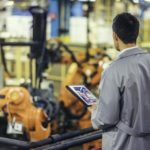 The fear around technology taking our jobs has been significant since Oxford University’s Carl Frey released a paper speculating on the risk of automation for a huge swathe of jobs back in 2014. In the decade since then, relatively few of those jobs have actually been automated. Indeed, a paper from Wharton actually found that investing in robotics often leads to more jobs being created.
The fear around technology taking our jobs has been significant since Oxford University’s Carl Frey released a paper speculating on the risk of automation for a huge swathe of jobs back in 2014. In the decade since then, relatively few of those jobs have actually been automated. Indeed, a paper from Wharton actually found that investing in robotics often leads to more jobs being created.
That’s not to say that automation doesn’t have an impact, of course, and the Wharton paper found that investments can affect middle managers, as the investments make workers more efficient, and less error-prone, so the need for supervision drops.
Gradual change
A second study, also from Wharton, suggests that investment in robotics is beginning to impact low-skilled workers. The study explored the impact automation was having on the upward mobility of workers, and indeed the impact of these changes in areas such as politics.
The researchers tracked the careers of about 16 million people over 16 years, from 2000 to 2016, focusing on two key aspects: how easily people moved to new jobs and the earning potential of those jobs. Together, these factors make up what they called “lifetime career value.” Although wage growth generally slowed over the period, they found that career values dropped further, mainly because automation reduced people’s chances of moving up to better-paying roles.
The numbers speak volumes. From 2004 to 2008, adding one robot for every 1,000 workers cut average career value by $3,900; from 2008 to 2016, it cut it by $2,480—equal to 1.7% and 1.1% of the 2000 average. Career value dropped most in areas with higher levels of automation.
The impact was hardest on lower-skilled workers, who struggled to find similar or better-paying jobs after being replaced by machines. High-skilled workers with college degrees, however, fared better, as they were able to find roles with better prospects. The data paints a clear picture: automation’s gains have often come at the expense of those least equipped to adjust.
Loss of bargaining power
The researchers believe that this could be due to the loss of bargaining power as a result of automation. This is born out by research from Bocconi University, which found that automation often results in a decline in trade union representation in firms.
The researchers analyzed union membership across a number of European countries over a 20-year period. The results show a clear downward trend, with Italy’s union membership rates approaching those of less unionized countries like France.
The Wharton researchers worry that automation not only impacts the career mobility of those industries where investments occur, but also spills over into other sectors, such as retail. This is because the purchasing power of individuals affected by automation falls, meaning businesses in their community suffer too.
“They cannot go to the restaurants, they cannot get a haircut as comfortably as they used to,” the researchers explain.
Wider impact
They also highlight the potential for automation to have a wider impact in areas such as housing, education, and even voting patterns. They found that there was a 1.1% increase in people enrolling in higher education in regions where career values increased, but a 13% decline in demand for housing in areas hit by a downshift.
There was also quite a profound impact on people’s political behavior, with support for Donald Trump’s 2016 campaign rising when career prospects fell, and falling when career prospects rose. This trend was also found in a collection of papers that showed how support for populist, right-wing parties rose among those whose jobs had been affected by automation.
The authors argue that events like Brexit, Trump, and the gilet jaunes protests in France cannot be viewed as electoral accidents but rather as clear consequences of profound changes in the labor market, many of which have been produced by automation. They believe that most of the technological changes today impact those in middle-skilled routine jobs in both manufacturing and service sectors, which are predominantly held by those in the lower middle class.
Loss of hope
The reasons for this are perhaps explained by a recent report from the IZA World of Labor, which highlights the negative impact of unemployment, especially on young men, who are often at the highest risk of automation.
Many issues facing unemployed men revolve around a loss of hope, and such issues are consistent worldwide. That many unemployed men resort to opioid abuse merely exacerbates their slide into poor mental wellbeing. This is often accompanied by marriage failure and a decline in civic or religious participation, all of which can make someone susceptible to the messaging of populist parties.
While it’s perhaps still a bit early to be gauging the full impact of new technologies, such as generative AI, the studies remind us that the disruption they cause can have a much wider impact than on the immediate jobs or industries.
“Overall, our findings highlight that it is essential to think about the effects of automation from a broader perspective — focusing on industries beyond those that are most immediately impacted and beyond the immediate occupation of workers,” the Wharton researchers conclude.